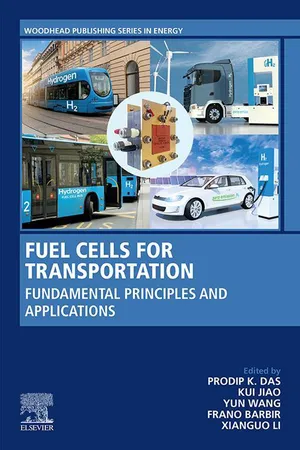
Fuel Cells for Transportation
Fundamental Principles and Applications
- 640 pages
- English
- ePUB (mobile friendly)
- Available on iOS & Android
Fuel Cells for Transportation
Fundamental Principles and Applications
About This Book
Fuel Cells for Transportation: Fundamental Principles and Applications is the first comprehensive reference on the application of fuel cells for light- and heavy-duty transportation. Addressing the subject from both a materials and engineering perspective, the book examines integration, modeling, and optimization of fuel cells from fundamentals to the latest advances. Chapters address every aspect of fuel cell systems for transport applications, including performance optimization, stack characterization, low-cost materials and catalysts, design of bipolar plates and flow fields, water and thermal management, durability under automotive driving cycles, cold start, state of the art characterization, optimization of various components, and more.
Each chapter reviews the fundamental principles of the topic before going on to examine the latest developments alongside current applications and real-world case studies. This is an essential reference for graduate students and researchers working on fuel cells for transport applications, as well as professional engineers involved in the application of fuel cells and clean energy and working in any sector of the transportation industry.
- Presents a comprehensive examination of the technologies, integration and application of fuel cells for transportation, from the fundamentals to the latest advances
- Examines the latest challenges, market outlooks and targets for fuel cells in light-duty and heavy-duty vehicles
- Offers solutions to fuel-cell system integration problems, optimization of operating conditions, and improvements for fuel-cell materials based on the latest developments
- Addresses key barriers to the commercial success of fuel cells for transportation, including durability, performance, materials and how to balance these factors
Frequently asked questions
Information
Table of contents
- Cover Image
- Title page
- Table of Contents
- Copyright
- List of contributors
- About the editors
- Preface
- Chapter 1. Fuel cells for transportation—an overview
- Chapter 2. Fuel cell fundamentals
- Chapter 3. Fuel cell modeling and optimization
- Chapter 4. Lattice Boltzmann modeling and artificial intelligence
- Chapter 5. Low platinum-based electrocatalysts for fuel cells: status and prospects
- Chapter 6. Platinum group metal-free catalysts for fuel cells: status and prospects
- Chapter 7. Effective transport properties for fuel cells: modeling and experimental characterization
- Chapter 8. Liquid water transport and management for fuel cells
- Chapter 9. Fuel cell short stack testing
- Chapter 10. Power demand for fuel cell system in hybrid vehicles
- Chapter 11. Bipolar plates and flow field design
- Chapter 12. Heat transport and thermal management
- Chapter 13. Mass transport in the cathode
- Chapter 14. Control-oriented computational fluid dynamics models for polymer electrolyte membrane fuel cells
- Chapter 15. Fuel cell durability under automotive driving cycles—fundamentals and experiments
- Chapter 16. Subzero startup of polymer electrolyte fuel cell—a battle between water and thermal management at low temperatures
- Chapter 17. Solid oxide fuel cells for vehicles
- Chapter 18. Hydrogen refueling stations/infrastructure
- Index